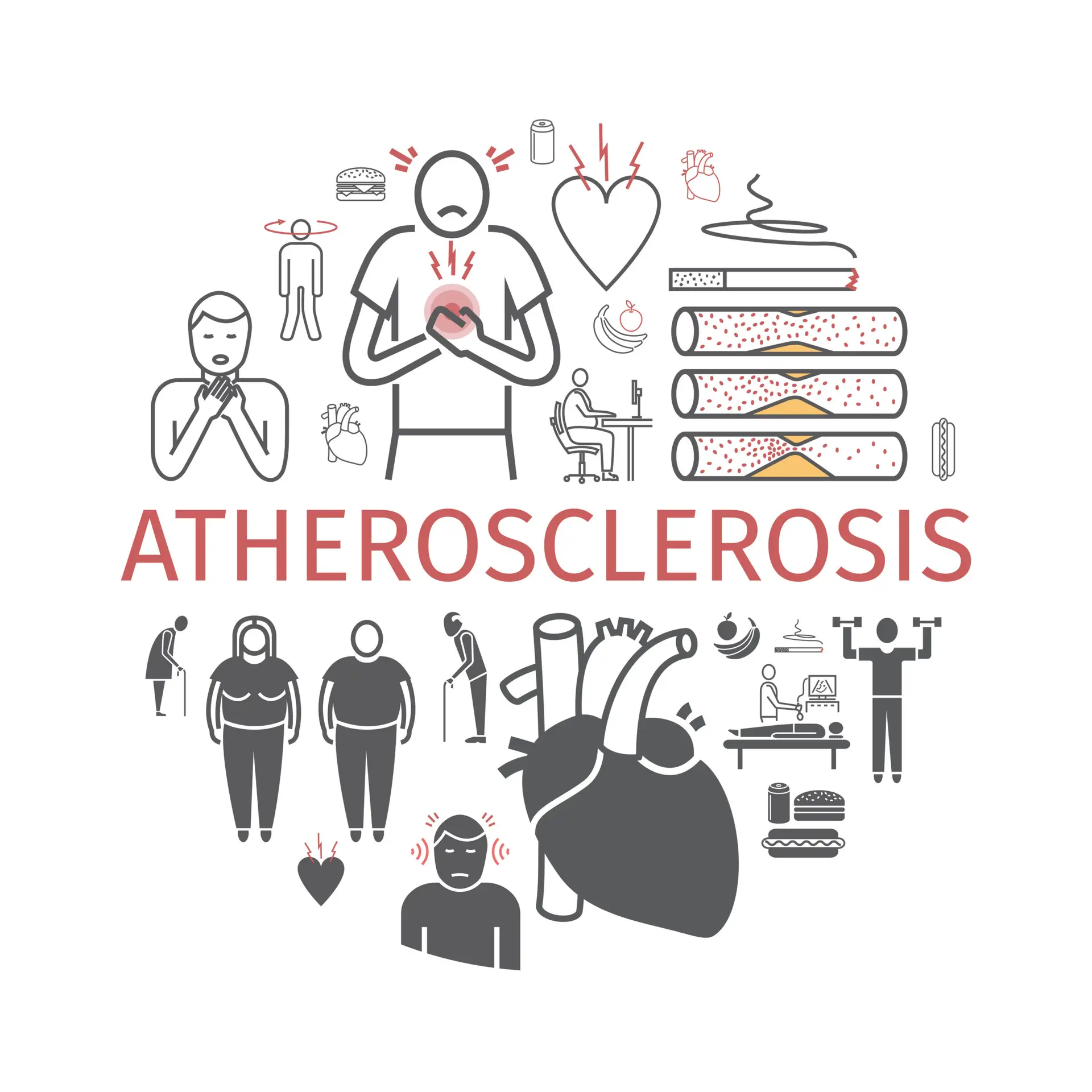Atherosclerosis: The Silent Threat to Heart Health
Atherosclerosis is a condition that significantly impacts heart health, involving the buildup of fatty deposits called plaques on the inner walls of arteries. This condition can lead to serious health issues, including heart attacks and strokes. Understanding atherosclerosis is crucial for maintaining heart health and preventing cardiovascular diseases.
What is Atherosclerosis?
Atherosclerosis is a progressive disease where arteries become narrowed and hardened due to plaque accumulation. Plaques are made up of fat, cholesterol, calcium, and other substances found in the blood. Over time, these plaques can restrict blood flow and lead to various complications affecting heart health.
How Atherosclerosis Develops
The development of atherosclerosis begins with damage to the endothelium, the inner lining of the artery. This damage can be caused by factors such as high blood pressure, smoking, high cholesterol, and diabetes. Once the endothelium is damaged, bad cholesterol (LDL) enters the arterial wall. The body’s immune system responds by sending white blood cells to digest the LDL, but over time, these cells and other substances form a plaque.
Risk Factors for Atherosclerosis
Several risk factors contribute to the development of atherosclerosis, many of which are related to heart health. These include:
- High Cholesterol: High levels of LDL cholesterol can lead to plaque formation.
- High Blood Pressure: Hypertension can damage the arteries, making them more susceptible to plaque buildup.
- Smoking: Tobacco smoke damages the endothelium and promotes plaque formation.
- Diabetes: High blood sugar levels can damage blood vessels and contribute to atherosclerosis.
- Obesity: Excess body weight is associated with high cholesterol, high blood pressure, and diabetes, all of which increase the risk.
- Sedentary Lifestyle: Lack of physical activity contributes to obesity and other heart health issues.
- Unhealthy Diet: Diets high in saturated fats, trans fats, and cholesterol can increase the risk of atherosclerosis.
Symptoms and Complications
In the early stages, atherosclerosis often has no symptoms. As it progresses, it can lead to symptoms and complications that affect heart health, including:
- Angina (Chest Pain): Reduced blood flow to the heart muscle can cause chest pain or discomfort.
- Heart Attack: A complete blockage of a coronary artery can lead to a heart attack, characterized by intense chest pain, shortness of breath, and other symptoms.
- Stroke: Atherosclerosis can also affect the arteries leading to the brain, resulting in a stroke if blood flow is obstructed.
- Peripheral Artery Disease: Plaque buildup in the arteries of the limbs can cause pain and mobility issues.
Diagnosis of Atherosclerosis
Diagnosing atherosclerosis is essential for managing heart health. Common diagnostic methods include:
- Physical Exam: A doctor may check for weak or absent pulses, signs of aneurysm, or evidence of poor wound healing.
- Blood Tests: These can measure cholesterol levels, blood sugar, and markers of inflammation.
- Imaging Tests: Tests such as ultrasound, CT scans, and angiography can visualize the arteries and detect plaque buildup.
- Electrocardiogram (ECG): This test records the electrical activity of the heart and can detect irregularities caused by reduced blood flow.
Treatment Options for Atherosclerosis
Managing atherosclerosis is crucial for improving heart health and reducing the risk of complications. Treatment options include:
- Lifestyle Changes: Adopting a heart-healthy lifestyle is fundamental. This includes eating a balanced diet low in saturated fats and cholesterol, exercising regularly, quitting smoking, and maintaining a healthy weight.
- Medications: Various medications can help manage atherosclerosis. Statins lower cholesterol levels, antihypertensives control blood pressure, and antiplatelet drugs reduce the risk of blood clots.
- Surgical Procedures: In severe cases, surgical interventions may be necessary. These include angioplasty (to open narrowed arteries), stent placement (to keep arteries open), and bypass surgery (to create a new pathway for blood flow).
Preventing Atherosclerosis
Prevention is key to maintaining heart health and avoiding the complications of atherosclerosis. Here are some preventive measures:
- Healthy Diet: Focus on a diet rich in fruits, vegetables, whole grains, lean proteins, and healthy fats. Limit intake of saturated fats, trans fats, and cholesterol.
- Regular Exercise: Engage in at least 150 minutes of moderate-intensity exercise per week. Activities like walking, cycling, and swimming are excellent for heart health.
- Avoid Smoking: If you smoke, seek help to quit. Avoiding tobacco smoke reduces the risk of atherosclerosis and other heart health issues.
- Manage Stress: Chronic stress can negatively impact heart health. Practice stress management techniques like mindfulness, meditation, and deep breathing exercises.
- Regular Health Screenings: Regular check-ups with your healthcare provider can help monitor risk factors such as cholesterol levels, blood pressure, and blood sugar.
The Role of InBody Scans in Monitoring Heart Health
Maintaining heart health requires ongoing monitoring and assessment. One effective tool for this is the InBody scan. InBody scans provide precise evaluations of body composition, including critical metrics like body fat percentage. These insights are invaluable for accurately assessing health status and validating the effectiveness of wellness programs.
With InBody’s innovative technology, individuals can make informed decisions to optimize health outcomes and achieve success. Conducting non-invasive InBody scans takes less than 60 seconds. This advanced technology accurately measures fat, muscle, and water levels, providing comprehensive full-page result sheets to monitor progress effectively.
Conclusion: Prioritize Heart Health with Comprehensive Assessment
Atherosclerosis is a significant concern for heart health, but with proper management and preventive measures, its impact can be minimized. Adopting a heart-healthy lifestyle, staying informed about risk factors, and utilizing tools like InBody scans can make a substantial difference.
InBody scans offer a precise and comprehensive evaluation of your body composition, helping you understand your health status and track the effectiveness of your wellness programs. With accurate measurements of fat, muscle, and water levels, you can make informed decisions to optimize your health outcomes. These non-invasive scans take less than 60 seconds and provide detailed results to monitor your progress effectively.
Stay proactive in managing your heart health and take advantage of innovative technologies like InBody scans. Schedule your InBody scan today and take the first step towards a healthier, more informed you. Visit our website or call us now to book your appointment and start your journey towards optimal heart health.












